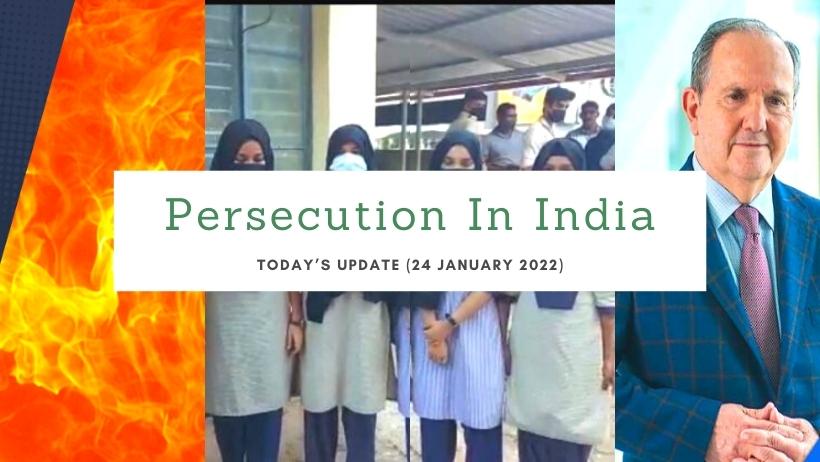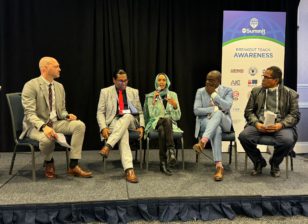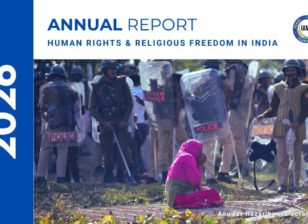In Separate Incidents Hindu Terrorists Burn Muslim Homes, Force Christians To Flee From Homes After Brutal Attacks
In two separate instances this weekend, Hindu terrorists attacked both Muslims and Christians without provocation – and, as always, with minimal consequences – continuing the nationwide trend of committing violent hate crimes against India’s most vulnerable populations.
In Madhya Pradesh state, Hindu terrorists burned down the homes of two Muslim families and one Hindu family. The victims reported that the leader of the group, Bunty Upadhyay, set the homes ablaze. Upadhyay is out on bail for terrorizing Muslim families just weeks before, when he demanded that they leave the village and made violent threats against them.
“After coming out of jail on January 20, Bunty first attacked [one man] with a rubber pipe and then set the houses on fire. He had also beaten up two other women,” said one of the victims. She added that Upadhyay used to constantly ask them to move out of the area, saying, “There is no place for Muslims here.”
The fact that Upadhyay committed this atrocity while out on bail shows that Indian law enforcement gives Hindu terrorists little more than a slap on the wrist for threatening violent crimes against minorities, and allows them to walk free despite knowing the threat they pose to innocent people.
In Chhattisgarh state, a mob of 200 Hindu terrorists led by Sanjith Ng attacked a Christian house church, leaving two Christians with serious injuries. Victims reported that Ng barged into the church during a prayer service, attacked several members of the congregation, and then dragged Pastor Hemanth Kandapan outside, where the mob beat him and one other congregation member so brutally that they suffered severe internal injuries. The terrorists hurled abuses at their victims during the attack, falsely accusing them of forcibly converting Hindus to Christianity.
“I was under house arrest for nearly nine hours,” Kandapan told International Christian Concern, a human rights group. “All through that time I was heckled and abused by the mob even in the presence of the police.”
A day after the attack, a Christian woman was forced by local extremist groups to convert to Hinduism, and several other Christians were pressured to follow suit. Fearing for their lives, at least five Christian families fled the village. They are unsure of when they will be able to return, if at all.
The Hindu terrorist mob included members of several dangerous extremist groups, including the Bajrang Dal, the Vishwa Hindu Parishad (VHP), and the Bharatiya Janata Party (BJP), Prime Minister Narendra Modi’s party. Despite this, Modi has not attempted to distance himself from these extremists, and instead offers them his implicit support through his silence.
Former UN Official on Genocide Prevention Calls Upon International Criminal Court To Prosecute Modi Government For Persecution
Juan E. Mendez, the first United Nations Special Adviser on the Prevention of Genocide, has expressed grave concern over a looming genocide of Indian Muslims at the hands of Hindu terrorists. In an interview with Al Jazeera published January 21, Mr. Mendez said if the situation continued to worsen, the United Nations Security Council (UNSC) should take action “sooner rather than later” to prevent further atrocities against minorities, describing the situation as “dangerous” and “deeply disturbing.”
“As a former adviser on the Prevention of Genocide… I agree this sort of genocide calls and expressions are of international concern,” said Mendez, commenting on the recent genocide alert issued against India by the prestigious watchdog organization Genocide Watch and its founder, Dr. Gregory Stanton. “Whatever they (Hindu nationalists) have done so far should not lead anybody to any kind of complacency because, in fact, I do think the situation is dangerous.”
Mr. Mendez said the Indian government, which ratified the Convention on the Prevention and Punishment of the Crime of Genocide in 1959, has a responsibility to “investigate, persecute and punish” people who have engaged in illegal hate speech. He was referring to the sluggish response of the Modi government to the Hindu extremist leaders who called for a genocide of two million Muslims last month in Haridwar city.
“Not doing that constitutes violations of the Genocide Convention,” he said. “It is the responsibility – in fact, the duty – of Indian Prime Minister Narendra Modi’s government to monitor the situation and respond appropriately to such calls for violence against any of the minorities, especially against the population at risk (Muslims), and to deploy forms of protection for them.”
Adding that India can be held to account by the International Criminal Court under the UNSC’s recommendation, he said, “The facts on the ground are serious enough that some expression of concern comes from the international forums like UN General Assembly, the UN Security Council, and UN Human Rights Council. If response from the Modi government isn’t appropriate, then the UNSC should step in to protect Indian minorities.”
During the Haridwar event last December, several Hindu extremist leaders encouraged Hindus to take up weapons and conduct a “cleanliness drive” to rid India of its Muslim population, explicitly stating that a genocide similar to the Rohingya in Myanmar should occur in India. Far from taking action against the Haridwar hate speakers and their massive following of Hindu extremists, Modi and the BJP have remained silent on the issue of rising anti-minority hatred, and in some cases have even defended the “right” of Hindu supremacist leaders to “promote their beliefs.”
Muslim Students Call Out Hijab Ban Even While Hindu Religious Expression Are Allowed In Schools
Muslim students who have been facing discriminatory and dehumanizing treatment for choosing to wear the hijab to a college in Karnataka state have become the center of a vicious debate surrounding freedom of religious expression in school, with multiple political parties taking advantage of the situation to push communal agendas. The students have been kicked out of classrooms into halls, yelled at by teachers, marked as absent for weeks, forced to write an apology letter, subjected to what one student called “mental torture,” and criticized by the state education minister as lacking discipline and “political.”
“Though it’s our fundamental and constitutional right [to wear hijab], they are not allowing us… We are just asking for basic fundamental rights. I don’t know why it is so tough to take us inside with a headscarf,” said Aliya Assadi, one of the students.
Meanwhile, Sathish M Bejjihally, a Bengaluru City University Academic Council Member, claimed that wearing the hijab will somehow prevent Muslim students from being able to take part in peer learning, and that what students wear “should not indicate faith.” He also claimed that wearing hijab will “create barriers” between the students, despite the fact that just weeks before, male students were also allowed to come to school wearing saffron-colored scarves, symbolizing their support for the Hindu supremacist movement.
In response, Professor Muzaffar Assadi of Mysuru University pointed out the blatant hypocrisy of Hindu nationalists’ claims that schools should be free from any form of religious expression, when Hindu beliefs and practices are prominently featured in nearly all public schools.
“If hijab could be treated as a religious symbol then students can’t come to classes with kumkum (bindi, vermillion), bangles. No public school is completely secular. [Hindu religious ceremonies] are conducted, Hindu gods’ photos will be on walls, [Hindu] festivals are celebrated in schools. Aren’t they religious?” Assadi asks.
Adding that this is not the only form of anti-Muslim discrimination on campus, Aliya said, “We can’t speak to each other in Urdu, we can’t say salaam to each other in the college… This matter has become communal and we are so sad about it. We did not want this to become communal.”
The anti-Muslim policy was implemented last month, and is a blatant violation of India’s constitutionally mandated secularism, as well as an attempt to bar women from education over the way they choose to dress. Karnataka is ruled by the BJP, and recently passed an anti-conversion law that fuelled a sharp increase in anti-minority hatred and hate crimes.




